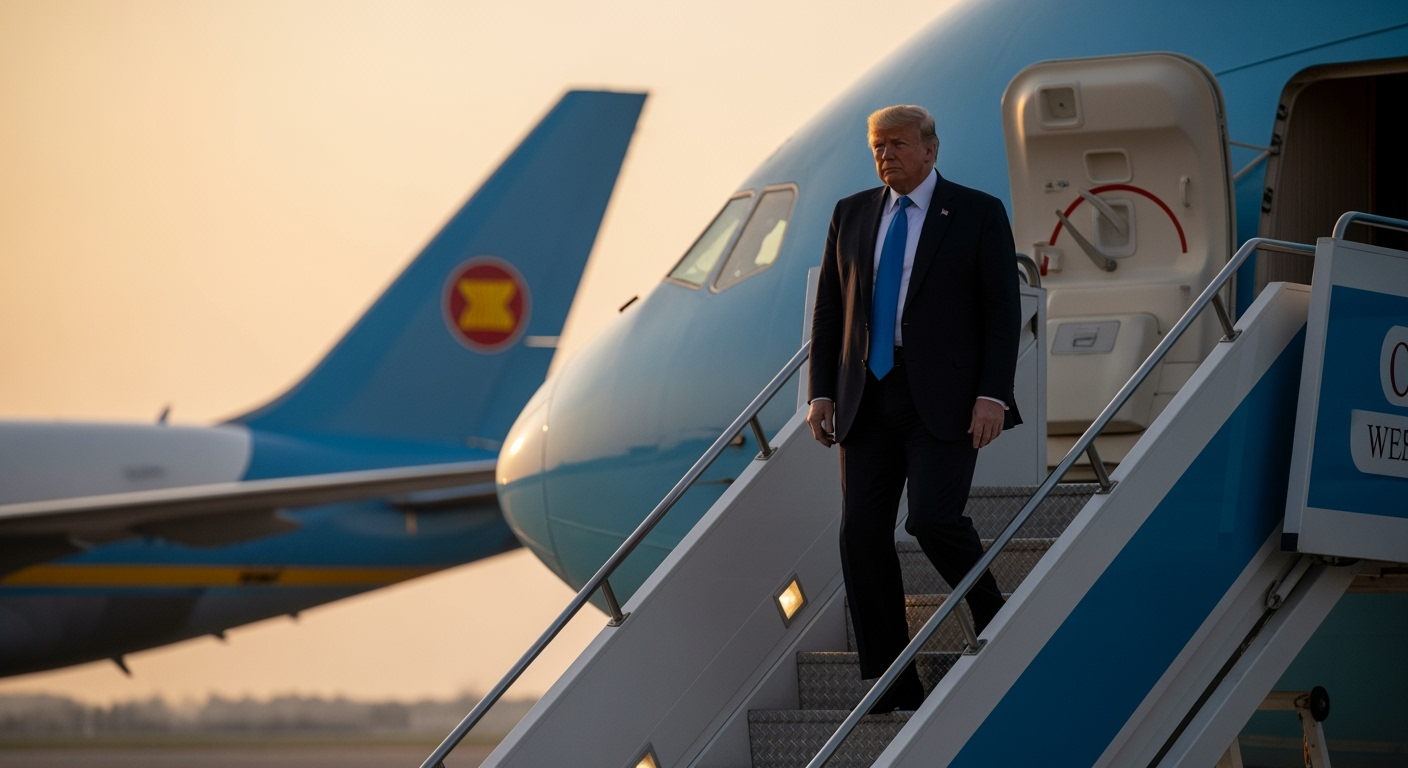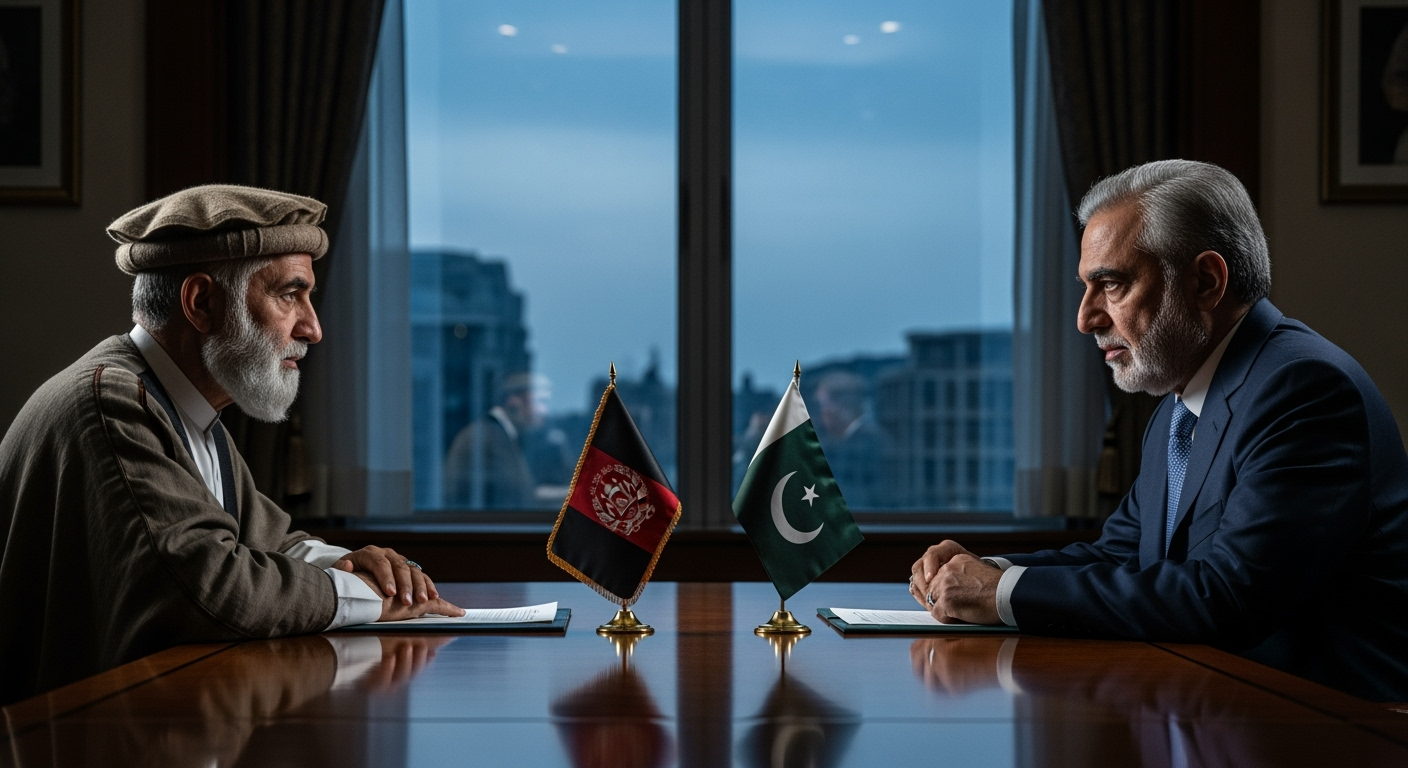Related Articles

President Trump Embarks on High-Stakes Asia Tour Amidst Domestic Challenges

Europe Mobilizes to Break China's Rare Earth Grip Amid Escalating Export Controls





ISTANBUL – In a critical diplomatic push to avert further bloodshed, Afghanistan and Pakistan are engaging in a second round of high-level security talks in Istanbul today, aiming to solidify a precarious ceasefire and address deep-seated cross-border tensions. The discussions follow a recent surge in military clashes that claimed dozens of lives and threatened to plunge the already volatile region into wider conflict. Mediated efforts, primarily by Qatar and Turkey, have brought the two nations to the negotiating table, but significant hurdles remain in forging a durable peace.
The renewed diplomatic engagement comes on the heels of over a week of intense military confrontations in October 2025, which saw both Afghan and Pakistani forces accuse each other of initiating aggression across their shared, disputed border. These clashes resulted in a significant human cost, with scores, and potentially hundreds, killed on both sides, including civilians. The hostilities also had immediate economic repercussions, forcing the closure of vital trade routes like the Torkham and Chaman crossings, stranding thousands of trucks laden with essential supplies and exacerbating humanitarian concerns in an already impoverished region. A 48-hour truce was initially declared, which, despite a brief collapse and mutual accusations, was eventually extended and has largely held thanks to sustained mediation efforts.
The recent escalation marked a severe deterioration in Afghanistan-Pakistan relations, which have been strained since the Taliban's return to power in Kabul in August 2021. Pakistan consistently accuses the interim Afghan government of providing safe haven to the Tehreek-i-Taliban Pakistan (TTP), a militant group responsible for a renewed wave of attacks on Pakistani soil. In response to alleged cross-border incursions and terrorist activities, Pakistan launched "precision strikes" against armed groups within Afghanistan, while the Taliban government retaliated with its own offensive, triggering fierce ground fighting along the Durand Line. The gravity of the situation underscored the urgent need for external intervention, leading to Qatar and Turkey stepping in to facilitate de-escalation and direct talks. These diplomatic overtures prevented the situation from spiraling into a full-scale war between the nuclear-armed neighbors.
The initial breakthrough came with the first round of talks held in Doha, Qatar, on October 19, 2025. The Pakistani delegation was led by Defense Minister Khawaja Muhammad Asif, while Afghanistan's interim government was represented by its Defense Minister, Mullah Muhammad Yaqoob, and intelligence chief Abdul Haq Wassiq. The Doha agreement centered on an immediate cessation of hostilities and the establishment of mechanisms aimed at fostering lasting peace and stability, with a particular focus on preventing cross-border terrorism against Pakistan.
Building on the Doha accord, the second round of discussions is convening today in Istanbul, Turkey. The Afghan delegation, led by Deputy Interior Minister Haji Najib (also identified as Mawlawi Rahmatullah Najeeb), departed for Turkey on Friday. Pakistan's Foreign Ministry spokesman, Tahir Hussain Andrabi, confirmed the talks and expressed Islamabad's expectation for a "concrete and verifiable monitoring mechanism" to effectively address the menace of terrorism originating from Afghan soil and to prevent further loss of life. The Istanbul meeting is tasked with detailing these mechanisms, which could include intelligence sharing on militant group locations and movements, as suggested by analysts. While Pakistan seeks assurances for its security, Afghanistan's primary objective is to ensure its territorial integrity.
Despite the current ceasefire and ongoing dialogue, the path to enduring peace is fraught with deep-seated historical grievances and conflicting priorities. A central point of contention remains the Durand Line, the 2,640-kilometer border established in 1893 between British India and Afghanistan. Pakistan considers this line an internationally recognized boundary, inherited after its independence in 1947. However, Afghanistan has consistently refused to recognize it, viewing it as a colonial imposition that arbitrarily divided Pashtun communities. During the Doha talks, Afghanistan's Defense Minister reportedly stated that the Durand Line is "imaginary" and will never be acknowledged as a border, further complicating cooperation on border security.
The issue of the TTP remains arguably the most pressing security challenge. Pakistan alleges that the Afghan Taliban government provides sanctuary and support to TTP militants, who then launch attacks into Pakistan. The TTP's activities have surged since the Taliban takeover in 2021, leading to a significant increase in casualties for Pakistani security forces. Afghanistan's interim administration, however, denies harboring the TTP and, in a significant shift, has stated it will no longer mediate talks between Pakistan and the TTP, branding it an internal Pakistani problem. This stance underscores the profound mistrust that permeates bilateral relations, further complicated by Pakistan's past support for the Afghan Taliban during their insurgency.
Adding another layer of complexity is the humanitarian crisis stemming from Pakistan's recent policy to expel undocumented Afghan refugees. This move, which impacts an estimated 1.7 million individuals, has been openly acknowledged by Pakistan as a pressure tactic aimed at coercing the Taliban into taking action against the TTP. The Afghan government has condemned this decision as "unacceptable," creating further diplomatic friction.
The outcome of these security talks has significant implications far beyond the immediate borders of Afghanistan and Pakistan. Regional stability hinges on their ability to establish a functioning relationship. Continued instability fuels broader counter-terrorism concerns, with groups like the Islamic State of Khorasan (ISIS-K) also posing a threat. Disrupted trade routes not only harm the economies of both nations but also impede regional connectivity and development projects.
The involvement of international mediators like Qatar and Turkey, alongside support from countries such as China, highlights the global recognition of the high stakes involved. China, for its part, seeks "managed instability" in Afghanistan to prevent terror exports to its own western frontiers. The international community hopes that these talks will lead to practical solutions, including improved border management and effective counter-terrorism cooperation, to ensure regional peace and prevent further humanitarian crises.
The security talks in Istanbul represent a critical juncture for Afghanistan and Pakistan. While the immediate ceasefire has provided a much-needed respite from deadly clashes, transforming this fragile truce into a lasting peace will require both nations to confront and resolve deeply entrenched issues. Addressing the thorny questions of cross-border terrorism, particularly concerning the TTP, and finding a mutually acceptable approach to the contested Durand Line are paramount. The ability of both governments to set aside historical animosities and prioritize cooperative security mechanisms will not only determine the future of their bilateral relationship but also profoundly impact the stability and prosperity of the wider South Asian region. The international community, through the ongoing mediation efforts, underscores the urgency and importance of these talks for regional and global security.